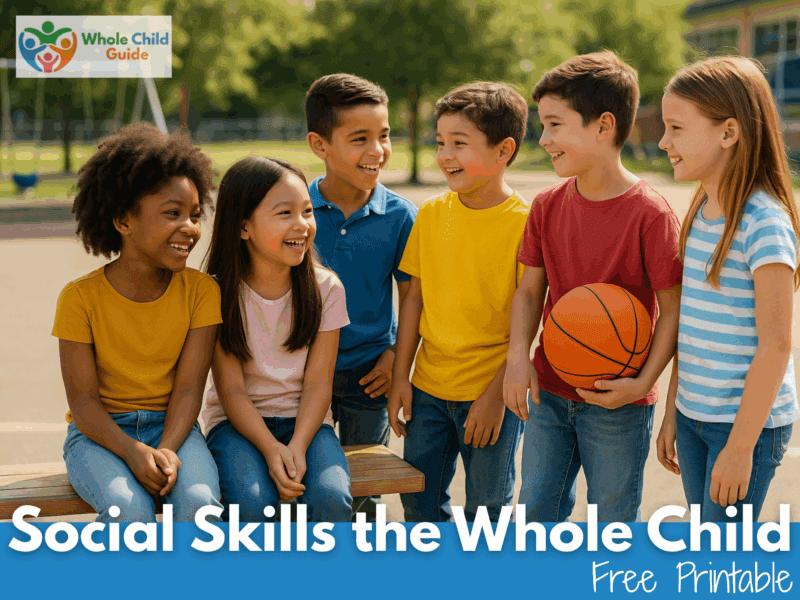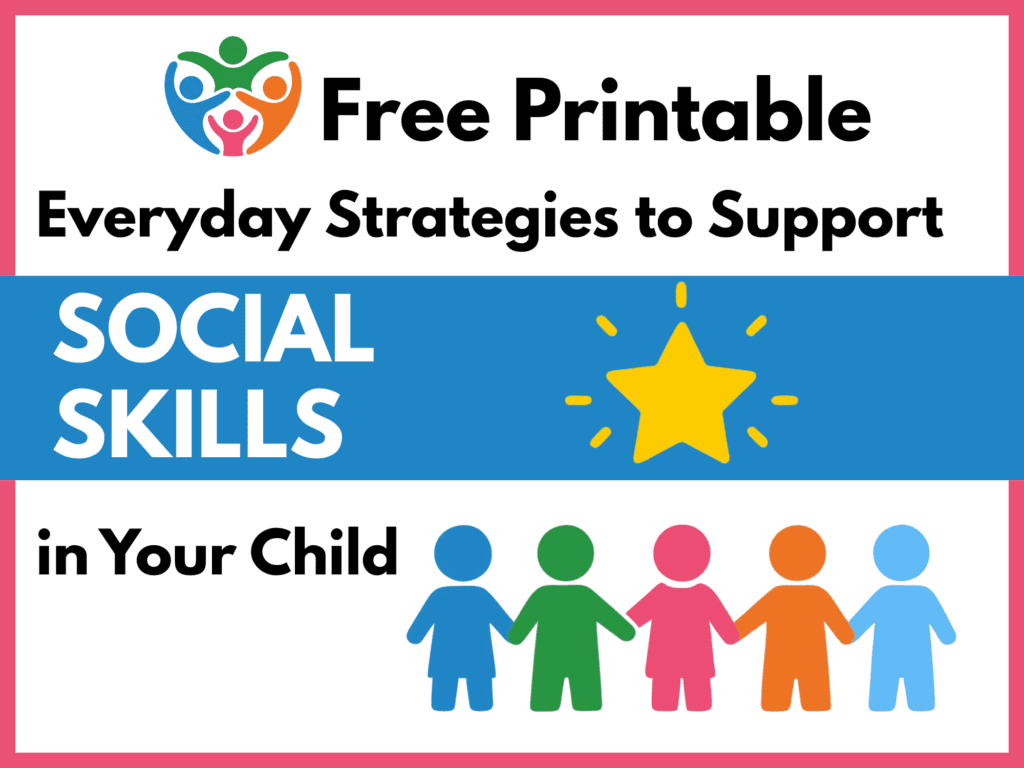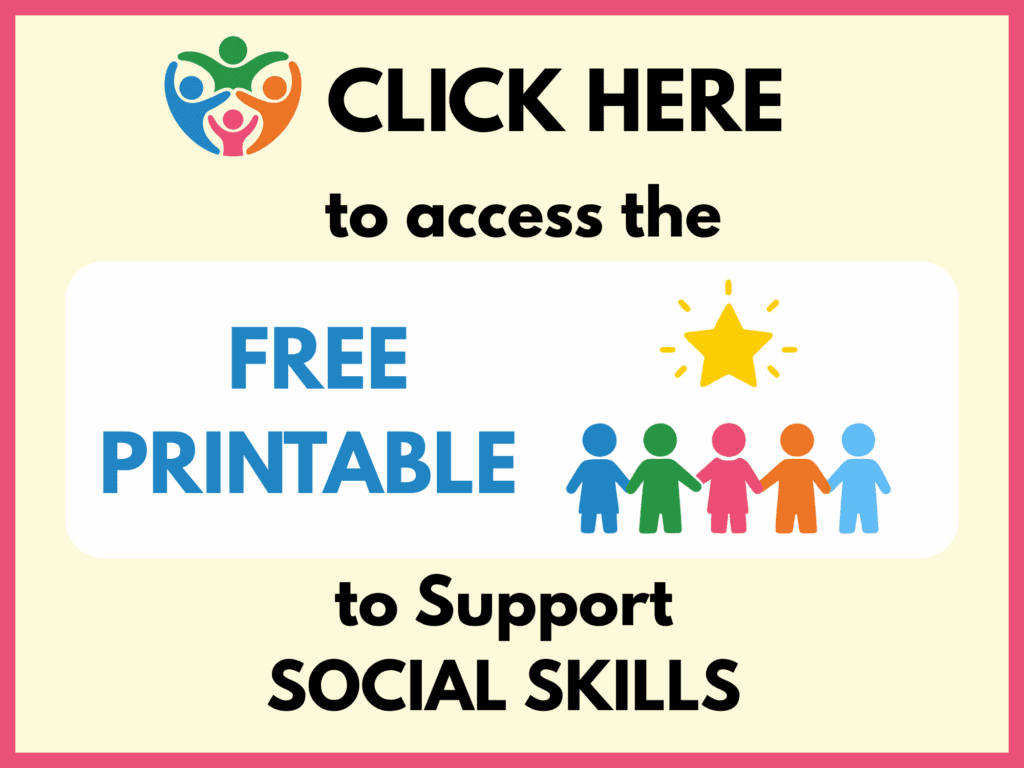
In our next resource on supporting the whole child, we are covering the topic of social skills and play. This area of development can be a challenge for many children, especially when they struggle in one of the contributing areas. You can download a FREE handout with 10 helpful tips to encourage social skills and play in children at the bottom of this post.
Why Social Skills Matter for Child Development
Social skills are at the heart of child development. From learning how to share toys in preschool to collaborating on group projects in middle school, social interactions shape how children connect, communicate, and problem-solve. Strong social skills build the foundation for confidence, emotional regulation, and resilience. Without them, kids may feel isolated, struggle in the classroom, or miss out on opportunities to learn through relationships.
Peer Relationships and Social Skills in Kids
For children, friendships and peer interactions are a cornerstone of learning, confidence, and belonging. But when a child struggles with emotional regulation, internal control, calming strategies, or transitions, these challenges often spill over into their social world.
- Emotional Regulation & Friendships
Kids who have difficulty regulating their emotions may overreact to small frustrations (like losing a game or waiting for a turn). This can make peers pull away, or it can lead to conflict, making it harder to form positive relationships. - Internal Control & Classroom Success
Self-control is what allows a child to wait in line, listen during circle time, or follow group rules in the classroom. Without this, peers may see them as “disruptive,” which affects how accepted they feel within the group. This is the executive function piece. - Calm Down Skills & Play
Play involves negotiation, compromise, and problem-solving. If a child can’t calm down when a disagreement happens (“That’s my toy!” or “I want to go first!”), it interrupts play and limits opportunities to practice cooperative skills. This is a challenge for many kids. - Transitions & Social Confidence
Moving from one activity to the next (recess to class, art to math, or even home to school) is full of social demands. Kids who struggle with transitions often miss social cues, come into situations dysregulated, or withdraw from group activities, which can make them feel “left out.”
In the classroom, these challenges can lead to a cycle: peers may avoid including the child, which impacts self-esteem, leading to more dysregulation. Over time, the child may feel isolated, even though what they really need is more practice and support in positive peer settings.
That’s why whole child support is so critical. Social skills aren’t a skill that develop in isolation. This set of skills are tied to regulation, sensory processing, language, and executive functioning. Supporting those underlying areas opens the door to stronger peer relationships and friendships.
The Connection Between Play and Social Skills
Play is fun! But it’s more than that for kids. Play is how kids practice and refine their social skills. Through pretend play, board games, and outdoor activities, children learn cooperation, turn-taking, negotiation, and empathy. Play allows kids to test boundaries in safe ways, make mistakes, and learn how to resolve conflict. Whether it’s building a block tower together or navigating rules in a game, play builds the building blocks of social growth.
Peer Relationships and the Whole Child Approach
When we look at peer relationships through a whole child approach, we recognize that social growth doesn’t happen in isolation. Social skills connect to emotional regulation, communication, executive function, and even sensory processing. A child struggling to manage frustration might find it harder to play cooperatively. Another child who has language delays may find it challenging to join group play. By viewing the whole child, we can see what supports are truly needed.
Practical Social Skills Activities for Home and School
Parents and educators can use everyday activities to boost social growth:
- At home, try “family game nights” to build patience and communication.
- In the classroom, set up structured group projects where kids have defined roles.
- On the playground, practice “inviting in” others who may be standing on the sidelines.
These structured yet playful opportunities help kids strengthen peer relationships in natural, meaningful ways. You can access 10 helpful tips to help children develop social skills at the bottom of this post.
When to Seek Extra Support for Social Skills
Some children need additional help developing peer relationships. If your child consistently struggles to make friends, avoids group play, or experiences repeated conflicts, it may be time to seek professional guidance. Child counselors, speech-language pathologists, occupational therapists, and parent coaches often provide social skills support.
How the Whole Child Guide Helps Families Find Support
Parents often search online for “child development professionals near me” or wonder if “social skills therapy for kids” might help their child. The truth is, those searches can feel overwhelming. It’s hard to know which professional is the right fit! There are many service providers out there, so it’s hard to know which one to choose: a speech therapist, occupational therapist, child counselor, or maybe even a specialized social skills group. That’s where the Whole Child Guide support directory makes a difference.
The Whole Child Guide is designed to take the guesswork out of the process. Instead of endless scrolling and second-guessing, you can use our whole child support directory to:
- Search by your child’s needs, not just by zip code. If your child struggles with peer relationships, communication, or emotional regulation, the Guide highlights the professionals who can help.
- Connect with trusted providers, from therapists and educators to coaches and play-based program leaders who specialize in child development and social growth.
- Find resources beyond therapy, including enrichment programs, nature-based playgroups, and even digital creators who design tools for social skills development.
- Build your child’s support team, with multiple professionals who understand how social, emotional, and developmental skills connect.
Whether you’re exploring social skills therapy for kids or simply want to connect your child with positive peer opportunities, Whole Child Guide helps you find the right match quickly and confidently.
Every child deserves the chance to feel connected, included, and supported, and with Whole Child Guide, families no longer have to navigate that journey alone.
Start your search today in the Whole Child Guide directory to find child development professionals near you who truly support the whole child.
Are You a Professional Who Supports the Whole Child?
Join the Whole Child Guide Membership for professionals and get:
✅ Unlimited access to all our printables — organized for easy use in therapy, education, and parent support
✅ A high-visibility listing in our Business Directory — where families search based on their child’s needs
✅ Access to Downloadable Business Growth Workbooks to grow the impact of your practice
✅ The WCG Business Builder Tool to help you reach aligned families and grow sustainably
✅ All for just ONE annual fee — a marketing write-off that works smarter, not harder
👉 Join Whole Child Guide for Professionals
Together, let’s connect more families with the care they need.



